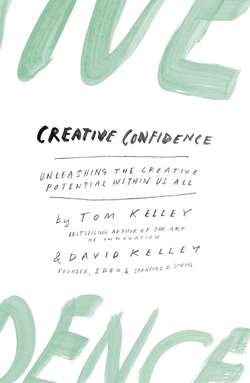Читать книгу Creative Confidence: Unleashing the Creative Potential Within Us All - David Kelley - Страница 17
A GROWTH STATE OF MIND
ОглавлениеOne prerequisite for achieving creative confidence is the belief that your innovation skills and capabilities are not set in stone. If you currently feel that you are not a creative person—if you think, “I’m not good at that kind of thing”—you have to let go of that belief before you can move on. You have to believe that learning and growth are possible. In other words, you need to start with what Stanford psychology professor Carol Dweck calls a “growth mindset.”
Individuals with a growth mindset, Dweck says, “believe that a person’s true potential is unknown (and unknowable); that it’s impossible to foresee what can be accomplished with years of passion, toil, and training.” She makes a compelling case, backed up by extensive research, that regardless of our initial talent, aptitude, or even IQ, we can expand our capabilities through effort and experience.
To fully appreciate the growth mindset, it helps to contrast it with its all-too-familiar evil twin, the fixed mindset. Consciously or unconsciously, people with a fixed mindset have the deep-seated belief that everyone is born with only a certain amount of intelligence and a certain amount of talent. If invited on a journey to creative confidence, people with a fixed mindset will prefer to stay behind in their comfort zone, afraid that the limits of their capabilities will be revealed to others.
Dweck explored the self-limiting nature of a fixed mindset in studying the behavior of freshman students at the University of Hong Kong. Since all classes and exams at the university are in English, incoming students who struggle with the English language are at a distinct disadvantage. After assessing the students’ language skills and their mindset, Dweck asked the incoming students a question: “If the faculty offered a course for students who need to improve their English skills, would you take it?” Their answers revealed the power of mindset. “Students with the growth mindset said an emphatic yes. But those with the fixed mindset were not very interested.” In other words, those under the influence of a fixed mindset were willing to sabotage their long-term chances for success rather than expose a potential weakness. If they let the same logic guide their choices throughout life, it’s easy to understand how their perception of their own abilities as permanently limited can become a self-fulfilling hypothesis.
A growth mindset, on the other hand, is a passport to new adventures.
When you open your mind to the possibility that your capabilities are unlimited and unknown, you already have your running shoes on and are ready to race forward.
In reality, we all have a little of both mindsets. Sometimes the fixed mindset whispers in one ear: “We’ve never been good at anything creative, so why embarrass ourselves now?” And the growth mindset whispers in the other ear: “Effort is the path to mastery, so let’s at least give this a try.” The question is, which voice are you going to listen to?
